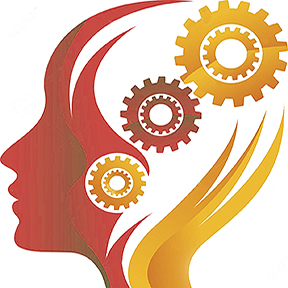

My dad was always a proud and independent man, so it was extremely difficult for him to adjust to the debilitating paralysis that resulted after brain surgery in 1992. The paralysis affected his hands, making some of the simplest tasks extremely difficult (if not impossible). Several successive surgeries gave him limited use of his hands; the most important improvement to him being the ability to “hold a fishing rod.”
This wasn’t the first time that my dad struggled with a physical handicap. He lost part of his right leg in the Vietnam War. Although that ended a distinguished military career, it didn’t prevent him from becoming a police officer. His hand paralysis, however, left him unable to work, so my dad found himself at home with a lot of time. This was an especially hard adjustment for him as he was accustomed to being a productive and active individual. In many ways, my dad felt he no longer had a place or purpose in this world.
At the time, neither of my parents were computer literate. They never owned a computer. I tried to convince them to purchase one for a long time, but they refused. I think that my parents were daunted by what they perceived as complicated technology. Nonetheless, I believed that a computer might relieve some of the boredom and isolation that my dad was feeling with his present situation.
When it came time for me to buy a bigger and better computer, there was no question as to what I was going to do with my old one. I took the computer to my parents’ house and set it up for my dad. I helped him set up an Internet connection and a web-based email address and showed him the crash course basics in Windows functions and web surfing. I found a few police and fishing-related sites that I thought he might enjoy and bookmarked them for him. As we live far apart, I was hopeful that he would learn enough to at least navigate the web and enjoy himself.
About a week after I had given my father the computer, I got a call from my mother. My dad wanted to know if I could find any veteran websites, particularly any related to his old unit in Vietnam. He was wondering if it was possible to use the web to locate any of the veterans with whom he had served. A quick search of the web yielded a couple of promising sites, including one devoted specifically to his division. I emailed them to him.
A few days later, my dad emailed me to tell me that he had registered his name and contact information with several of the veteran sites. He was hopeful that some of his old friends might see his name and contact him. It had become evident to me that my dad had reached the point in his life where he was looking back on the past and trying to reconnect with those memories and feelings.
When my dad received the first response to his postings, he was ecstatic. He forwarded the email discussions between himself and his old army buddy to me, and I felt that their discussions were a cathartic experience for both men. This was someone with whom my dad had literally been through life and death, and they were able to talk about their shared experiences in a manner that he could never do with anyone else who had not also been through it.
Other veterans soon contacted my dad. He discovered a whole community of brothers on the Internet. A flood of long-faded memories snapped back into sharp focus. He was excited, animatedly relating to us fresh stories and anecdotes from that period of his life. In a sense, he was that young 24 year-old once more.
Not long after that, he bought a scanner so that he could trade family pictures with other veterans over the net. I installed the scanner and showed him how to operate it. I thought it would be too complicated for him to use, but by the time I got home I found an email from him with a picture of his fishing boat attached.
So many of my dad’s old buddies were curious as to how he had been and how his life was going. Many of them had websites, so one weekend I created a personal website for him. He was so proud of it that he immediately emailed the address to all of his friends.
One day my dad forwarded to me an email he received from the veteran registry website. It was from a man who was desperately trying to find him. My dad said he did not remember serving with any man by the sender’s name, but that he would respond to the message anyway.
The man had not served with him in the military. In fact, at 32, he was too young to have been a soldier with my father. He was looking for my dad because the young man believed that he might have fathered him during his second tour in Vietnam.
The man’s late Vietnamese mother told him that his father was an American serviceman. She was mistakenly told that her lover had died in combat, but later learned it to be untrue. All this man knew was that his father was a United States serviceman in Vietnam at the time of his conception, was in the air division, and shared my dad’s last name.
My dad, of course, was not the father of this young man, but it led us to talk about that period of his life in a way that we had never talked before. The idea that I could have a brother I had never known was a shock to me, even if it wasn’t true. And yet, even though he was not this young man’s father, my dad felt a great deal of empathy for what he was going through. “Can you imagine what it would be like, never knowing who your father is?” he asked me. I could not.
Helping this young man find his father became my own dad’s personal mission. He looked through his military yearbooks and other available records, compiling for the man a list of Bishops who had served at the same time and in the same region as my father. My dad also queried his new-found contacts in the Internet veteran community, asking for information.
Not long after my dad received another email from the young man. He had found his true father and wanted to thank my dad for making it possible. Choking back his own tears, my dad recounted to me the man’s story of his emotional first meeting with his father; the man never knew that he left behind a son in Vietnam.
I was so proud of my dad that day. A man who had, not long before, thought of himself as an island adrift in a great sea learned that he still made a difference. Today, he continues to make a difference to me and to his broadening circle of friends.
People often argue that the computer age has robbed us of our humanity and to some degree that is a fair, because the computer can isolate us and stymie our relationships. But for my father, the computer has reconnected him with the world and allowed his humanity to shine through.
